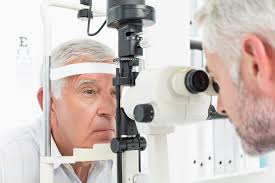
It comes as no surprise that as people age they often experience changes in their vision. A minor eye problem can turn into a major issue if left untreated. For seniors and others, poor vision can affect their quality of life by decreasing their ability to drive, increasing a risk of falling and accelerating a loss of independence. It is important to have your vision checked by a healthcare professional at least once each year, especially if you are over 60.
Here are some common age-related vision problems, and what you can do about them.
Cataracts are the most common cause of blindness, with almost 25 million people over the age of 40 suffering from the disorder. Cataracts occur when the lens of the eye becomes opaque and interferes with vision. Half of the population of Americans will develop cataracts by their 80th birthday.
You are at greater risk for developing cataracts if you smoke, have diabetes, high cholesterol or high blood pressure, or if you have had an eye injury or eye surgery. Exposure to sunlight can also play a role.
Symptoms of cataracts can include blurred vision, problems driving at night, double vision and light sensitivity. People with cataracts may experience reduced intensity of colors and see halos around lights.
When cataracts start to develop, you may be able to cope with vision changes by intensifying the light when reading or changing your eyeglass prescription. Tinted glasses can lessen glare and halos. Your ophthalmologist will tell you when it is time for surgery to replace the affected cloudy lens with a clear implant.
- Age-Related Macular Degeneration
Age-related macular degeneration (AMD) is the result of damaged tissue in the retina that affects central vision. The dry type of age-related macular degeneration affects 90 percent of people with the disorder.
Smokers and people who are obese are more likely to develop age-related macular degeneration. Exposure to UV (ultraviolet) light can play a part, and a nutrient deficiency can also affect the retina. There is a genetic component, so if you have a family history of AMD you should be aware that there is a possibility that you will develop the disorder as well.
People with AMD suffer a subtle loss of vision resulting from the breakdown of retinal cells. You may find that straight lines seem wavy, or you might only see parts of letters. Other symptoms include hazy vision, the need for more light when reading and colors that appear dull. There may be an empty area in the center of your vision.
The dry type of AMD may develop into the more serious wet type of AMD. There is no definitive cure, but your doctor may recommend vitamins C, E, lutein and zeaxanthin to slow the progression. Anti-VEGF treatments limit the development of new blood vessels that impair vision, thermal laser treatments apply heat to slow the disease, and photodynamic therapy destroys harmful blood vessels.
Glaucoma is most common in people over the age of 40. Vision loss is caused by high pressure inside the eye that damages the optic nerve. The optic nerve is responsible for vision by carrying images from the eye to the brain. Poor circulation can result in glaucoma and optic nerve damage. Most cases of glaucoma develop slowly, and you may not notice symptoms at first.
Older adults are at a higher risk for developing glaucoma. African Americans and Hispanics have a higher risk than others, along with people who have a family history of the disease. If you are very nearsighted or very farsighted, suffer from diabetes or if you have had an eye injury, you may be at risk.
Often there are no symptoms of glaucoma until vision is impaired. Some people experience eye pain after watching TV, halos around lights, headaches, eye pain, and redness of the eye. Left unchecked, glaucoma can cause blindness.
The best thing to do to avoid the effects of glaucoma is to visit the eye doctor regularly. Your eye doctor can perform a glaucoma test to assess the pressure in the eye. If you have glaucoma, it can be treated with eye drops, laser treatments and possible surgery.
Hiring a Caregiver
An in-home caregiver can help your loved one with transportation to the eye doctor. Home Helpers of South Shore is owned and operated by a compassionate health professional with a strong understanding of the needs of aging seniors. Contact Home Helpers to help your aging loved one.
Please fill out the form on the left and we will get in touch with you about setting up in-home health care, or call us at (781) 912-3196 to determine the plan that is right for you.
We serve the following communities:
Abington , Braintree , Brockton , Buzzards Bay , Carver , Cohasset, Dighton , Duxbury , Falmouth , Halifax , Hanson , Hingham , Holbrook , Hull , Humarock , Kingston , Lakeville , Marshfield , Mashpee , Middleboro , Norwell , Pembroke , Plymouth , Plympton , Quincy , Randolph , Rockland , Sandwich , Scituate , Taunton , Wareham , Weymouth , Whitman
